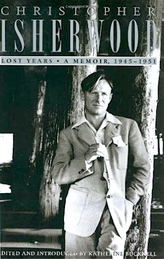A WRITER'S WIT |
My Book World
I'VE MADE IT MY GOAL to read the entire oeuvre of late British-American author, Christopher Isherwood, over a twelve-month period. This profile constitutes the twenty-first in a series of twenty-four.

With the completion of this book I’ve now read all 3,069 pages of Isherwood’s diaries. Though he calls this one a memoir, it is a reconstructed diary of the years 1945-1951. In essence, Isherwood keeps two records: a day-to-day account of people he interacts with, major and minor events. In the more expanded Diaries Volumes One – Three, he writes out detailed accounts of events, observations, prejudices, fears about his health, and high and low spots with his lovers, particularly Don Bachardy. In Lost Years, however, Isherwood holds nothing back. Except for changing some names of partners, he tells all about his sex life during these six years. At one point he quietly boasts (or otherwise he would not mention it) that he has had over 400 sex partners (and he’s only in his forties, heh, heh). His pattern in this volume is to list the day-to-day events, and, as of this writing (1973) he combs his (excellent) memory to expound on those events. At the same time, as a heavy drinker, he often admits he can remember little or nothing about things he has written.
Still, he does comment on his writing projects, his relationship at the time (a younger man, William Caskey, a photographer), and notes about books he is reading and films he’s worked on as a screenwriter or viewed for entertainment. His prejudices against Jews, the French, and dark-skinned people seem more entrenched than when he is older. Again, is he a victim of his time and place of birth, or does he willfully deny that these prejudices are immature and wrong-headed? In spite of his flaws, I find much to admire in Isherwood: a man who creates, sings, listens to and critiques his own tunes. Opinionated people often become that way because they realize they are correct about so many things, and that reinforcement causes them to be even more opinionated. We trust them. And often we should.
Some nuggets:
Editor Katherine Bucknell, from her Introduction: “Isherwood never gave up his writing as [Edward] Upward did; for he was a writer above all, not an activist, even when it came to his homosexual kind. By writing in explicit sexual detail about his intimate behavior and that of his close friends and acquaintances in the years immediately following the war, he was portraying the hidden energies and affinities of homosexual men all over the United States who during that period were gathering increasingly in certain, mostly coastal cities as peace and prosperity returned to a country much altered by vast wartime mobilization. This hidden social group, whose consciousness of itself as a group was intensified by the demographic shifts brought about by the war and then extended throughout the 1950s, was to emerge in its own right as a significant force of change in American and in western culture generally during the final third of the twentieth century. Much of this change began in southern California, and Isherwood was living at its source. His personal myth is part of, and in many ways emblematic of, the larger myth of the group to which he belonged: and his reconstruction of his life during the postwar years foretells much of what was to come” (xiv).
Writing about himself in the third person, CI says, helps him to separate himself from the “I” of the rest of his writing: “Isherwood would never cease to be aware of the way in which all success, and indeed all art, excludes or marginalizes somebody. In a sense, his art tries to do the opposite, but whatever is brought to the fore must push something else aside. As a schoolboy he had written to his mother: ‘I have an essay on “omission is the Beginning of all Art” which it may amuse you to see.’ And he explains at some length in Christopher and His Kind, much of the difficulty he had with his work, throughout his career, can be understood as his struggle with the question of how the artist decides what to leave out of his art. The subjects not chose, the themes not addressed, haunt the imagination with the pain of their rejection; for the novelist who feels a strong loyalty to historical fact, the necessity to omit is like the burden of original sin, a crime of neglect which must precede the possibility of artistic creation” (xxxiii).
Isherwood reveals a romantic notion has: “The rest of the day was spent at Bill’s La Cienega apartment. It seems to me now that La Cienega was perhaps the most romantic street in Los Angeles, in those days. It had an un-American air of reticence, of unwillingness to display itself. Its shops were small and unshowy; its private houses were private. Also—and this was what really appealed to Christopher—it seemed to have a bohemian, self-contained life of its own. It was a ‘quarter,’ which didn’t make any effort to welcome outside visitors. Many of its dwellers were hidden away in odd little garden houses and shacks, within courtyards or on alleys, behind the row of buildings which lined the street. It was in one of these that Bill lived” (15).
A bit of literary gossip: “Katherine Anne [Porter] treated them like favored nephews; she even cooked meals for them. Unfortunately, however, beneath Christopher’s deference and flattery, there was a steadily growing aggression. By her implicit claim to be the equal of Katherine Mansfield and even Virginia Woolf, Katherine Anne had stirred up Christopher’s basic literary snobbery. How dare she, he began to mutter to himself, this vain old frump, this dressed-up cook in her arty finery, how dare she presume like this! And he imagined a grotesque scene in which he had to introduce her and somehow explain her to Virginia, Morgan [Forster] and the others . . . [t]hus Katherine Anne became the first of an oddly assorted collection of people who, for various reasons, made up their minds that they would never see Christopher again. The others: Charlie Chaplin, Benjamin Britten, Cole Porter, Lincoln Kirstein” (68-9).
CI became acquainted with the famed Joseph Pilates, designer of physical education for compromised bodies, when CI joined the man’s gym: “Mr. Pilates was a bully and a narcissist and a dirty old man; he and Christopher got along very well. When Christopher was doing his workout, Pilates would bring one of his assistants over to watch, rather as the house surgeon brings an intern to study a patient with a rare deformity. ‘Look at him!’ Pilates would exclaim to the assistant, ‘That could have been a beautiful body, and look what he’s done to it! Like a birdcage that somebody trod on!’ Pilates had grown tubby with age, but he would never admit it; he still thought himself a magnificent figure of a man. ‘That’s not fat,’ he declared, punching himself in the stomach, ‘that’s good healthy meat!’ He frankly lusted after some of his girl students. He used to make them lie back on an inclined board and climb on top of them, on the pretext that he was showing them an exercise. What he really was doing was rubbing off against them through his clothes; as was obvious from the violent jerking of his buttocks” (120). Lust may be in the eye of the beholder!
CI on screenwriting, something he did to pay the bills: “Christopher had always been a model employee. He despised amateurs like Brecht who, when they condescended to work at a film studio, whined and sneered and called themselves whores or slaves. Christopher prided himself on his adaptability. Writing a movie was a game, and each game had a different set of rules. Having learned the rules, Christopher could play along with enjoyment—especially if he had a fellow player like Gottfried Reinhardt who was enjoying himself too. Once Christopher had accepted the fact that this game was to be played according to the Viennese code, he became almost as Viennese as Gottfried and Fodor. I have no doubt that some of the script’s most Viennese touches were contributed by him, though I can’t remember which they were” (152).
CI quotes author Cyril Connolly: “. . . the true function of a writer is to produce a masterpiece . . . no other task is of any consequence. Obvious though this should be, how few writers will admit it, or having made the admission, will be prepared to lay aside the piece of iridescent mediocrity on which they have embarked! Writers always hope that their next book is going to be their best, for they will not acknowledge that it is their present way of life which prevents them from ever creating anything different or better” (275).
Isherwood begins keeping journals when he is a schoolboy and continues during his short time at Cambridge. He continues while living in 1930s pre-Nazi Berlin. After he writes The Berlin Stories, he destroys those diaries, thinking that they have served their purpose, that he’d rather relive his past through his fiction than his journals. However, he lives to regret his decision and spends the rest of his life attempting to document his life. I believe that perhaps these diaries may end up being his true literary legacy. They provide the scaffolding upon which his other twenty or so works rest. And for all his “fumbling,” his is a life truly fulfilled. He both works hard and has a great deal of fun, and he never apologizes for either.
NEXT TIME: New Yorker Fiction 2016


 RSS Feed
RSS Feed